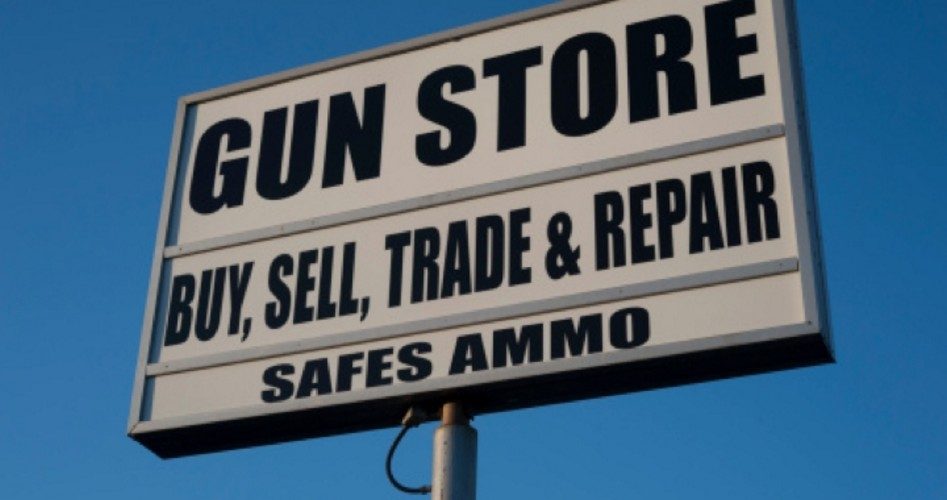
For seven years Theodore Roosevelt Liberti — known to his friends as “T.R.” — ran a retail gun shop in New Jersey and then moved it to Florida. T.R.’s bank had always been BankUnited (BU), which handled his accounts and cleared his customers’ credit card purchases. But when he decided to open an online store called Discount Ammo-N-Guns, BankUnited closed his accounts on March 12 “pursuant to the terms and conditions listed in our Depositor’s Agreement.”
When T.R. demanded a further explanation, the bank remained silent. T.R.’s wife and business partner, Elizabeth, said:
I was very angry. They were very inconsiderate. We had all our credit cards going through that bank.
All of a sudden we had to run and find another bank to keep our business going. We [had to] shut down for two weeks.
[BU] wouldn’t even tell us why.
When the bank finally responded, its explanation was unsatisfactory:
This letter in no way reflects any derogatory reasons for such action on your behalf, but rather one of [our] industry.
Unfortunately your company’s line of business is not commensurate with the industries we work with.
Liberti is considering suing the bank for violating his constitutional rights. In the meantime, his story has gone viral and Liberti thinks “a lot of people will drop them, and they will feel the sting.”
If this were just a one-off incident, it would soon fade from the headlines. But Black Rifle Armory in Henderson, Nevada, received a similar letter from its bank, which froze the company’s accounts until the bank could determine if any of its transactions were “suspicious.”
Following the Obama administration’s “Operation Broken Trust,” an operation that began just months into his first term, the Financial Fraud Enforcement Task Force was created initially to “root out and expose” investment scams. After bringing 343 criminal and 189 civil cases, the task force began looking for other targets.
The task force is a gigantic interagency behemoth, involving not only the Department of Justice (DOJ) and the FBI, but also the Securities and Exchange Commission (SEC), the U.S. Postal Service, the Internal Revenue Service (IRS), the U.S. Commodity Futures Trading Commission (CFTC), and the U.S. Secret Service.
The next target for the task force was credit card payment processors, such as PayPal, along with porn shops and drug paraphernalia stores. In 2011, it expanded its list of “high risk” businesses to include gun shops. Peter Weinstock, an attorney with Hunton & Williams, explained:
This administration has very clearly told the banking industry which customers they feel represent “reputational risk” to do business with….
Any companies that engage in any margin of risk as defined by this administration are being dropped.
In 2012, Bank of America terminated its 12-year relationship with McMillan Group International, a gun manufacturer in Phoenix, and American Spirit Arms in Scottsdale. Said Joe Sirochman, owner of American Spirit Arms:
At first, it was the bigger guys — gun parts manufacturers or high-profile retailers. Now the smaller mom-and-pop shops are being choked out….
They need their cash [and credit lines] to buy inventory. Freezing their assets will put them out of business.
That’s the whole point, according to Kelly McMillan:
This is an attempt by the federal government to keep people from buying guns and a way for them to combat the Second Amendment rights we have. It’s a covert way for them to control our right to manufacture guns and individuals to buy guns.
With the Obama administration unable to foist its gun control agenda onto American citizens frontally, this is a backdoor approach that threatens the very oxygen these businesses need to breathe. Richard Riese, a senior VP at the American Bankers Association, expanded on the attack through the banks’ back doors:
We’re being threatened with a regulatory regime that attempts to foist on us the obligation to monitor all types of transactions.
All of this is predicated on the notion that the banks are a choke point for all businesses.
Some politicians are finally taking notice of the attacks on gun makers and purchasers, including Senator Ted Cruz. On May 7 Cruz released his list of “76 Lawless Obama Actions” which listed, at Number 8:
Government agencies are engaging in “Operation Choke Point” where the government asks banks to “choke off” access to financial services for customers engaging in conduct the Administration does not like, such as “ammunition sales.”
Rep. Darrell Issa (R-Calif.), chairman of the House Oversight and Government Reform Committee, and Rep. Jim Jordan (R-Ohio), chairman of the House’s Economic Growth Subcommittee, sent a demand letter to U.S. Attorney General Eric Holder:
The [committee] is concerned that both the goal and mechanisms of Operation Choke Point may constitute serious mismanagement and abuse of [your] department’s … authority….
There is evidence that the true goal of Operation Choke Point is to target online lenders and the payment processors who serve them. The extraordinary breadth of the Department’s dragnet prompts concern that the true goal of Operation Choke Point is not to cut off actual fraudsters’ access to the financial system, but rather to eliminate legal financial services to [businesses to] which [your] Department objects….
[Your Department] is needlessly punishing good actors with the bad, and threatening legitimate merchants.
Holder has refused, so far, to release any of the documentation demanded by Issa and Jordan in their letter, allowing Operation Choke Point to continue its illegal and unconstitutional attacks on not only honest merchants in general but especially those engaged in the gun business. If frontal attacks on Americans’ right to keep and bear arms won’t work, the backdoor assault of Operation Choke Point just might.
A graduate of Cornell University and a former investment advisor, Bob is a regular contributor to The New American magazine and blogs frequently at www.LightFromTheRight.com, primarily on economics and politics. He can be reached at [email protected].



